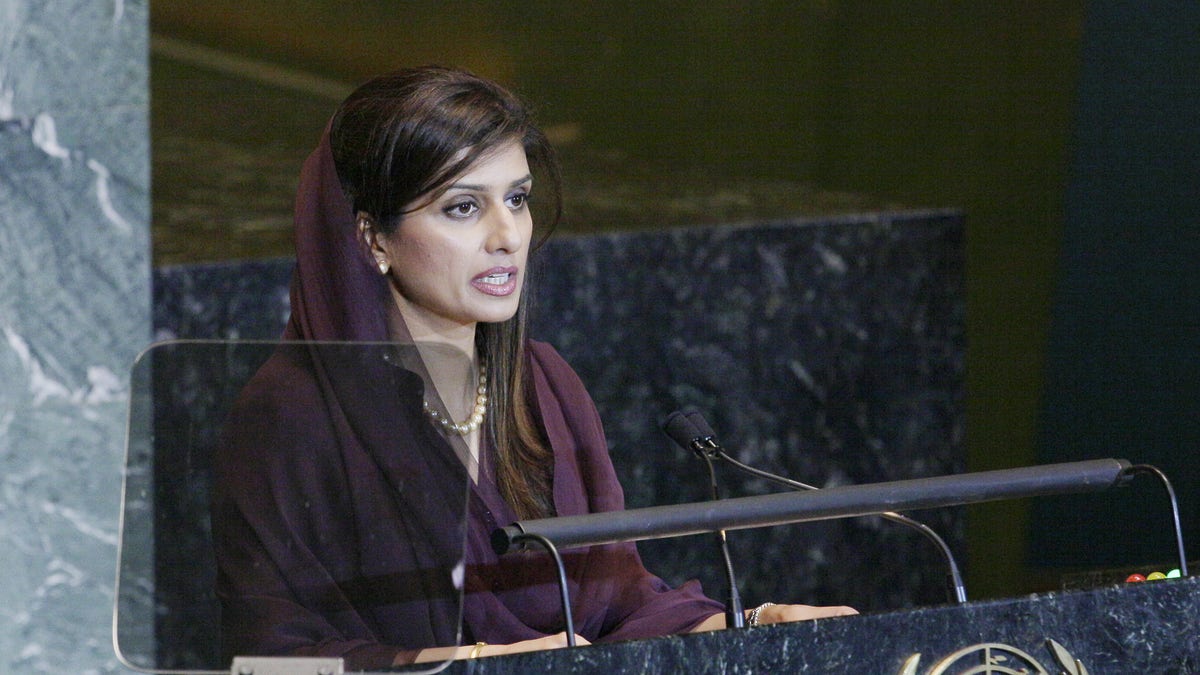
Sept. 27, 2011: Hina Rabbani Khar, foreign minister of Pakistan, addresses the General Assembly. (AP)
The United States' strained relationship with Pakistan has grown more tense after 50 influential imams and religious leaders there threatened a jihad if the U.S. attacks the nuclear-armed country.
The threat came as Pakistan seemed to speak from both sides of the mouth. Foreign Minister Hina Rabbani Khar insisted to the United Nations General Assembly on Tuesday that the government is part of the solution in Afghanistan.
"Pakistan is willing to do its best with the international partners and, most notably, the governments of Afghanistan and the United States, to acquit itself of this high responsibility (in Afghanistan)," she told the 193-nation assembly.
But her remarks came after Pakistan warned the United States to stop accusing it of playing a double game with Islamist militants and as it showered praise on China.
Now the U.S. must deal with the threat of a jihad that security analysts warn would create serious problems for the U.S. as it tries to end violence originating in Pakistan -- and the Pakistani government can't be trusted, even if there's no alternative.
The religious leaders threatening jihad are associated with the Sunni Ittehad Council (SIC), a coalition of local groups. According to Pakistani news reports, the council issued a press release declaring that it is illegitimate to call the U.S. a superpower because only Allah deserves the title.
The scholars urged the Pakistani government to end the country’s role in the war on terrorism and to try to establish a new international bloc made up of China, Turkey, Iran, Afghanistan and Pakistan.
An analyst told FoxNews.com that the threat should be taken seriously.
“This must not be discounted,” the analyst said. “This is 50 very influential Imams and religious leaders who want a holy war against the U.S. …and they call for scholars, religious leaders to start urging the military rank-and-file to participate or prepare for jihad or holy war against the U.S. Use of Trojan horses or insiders like we have seen with the CIA will likely increase. “
Walid Phares, an adviser to the Anti-Terrorism Caucus in the U.S. House, told Fox News that the call by so many clerics is unusual, which means that a significant political force is behind this open call.
He said that the fatwa is linked to attacks on Pakistan, which could mean that figures in intelligence circles could be behind it, too. He noted that it comes as jihadi and Taliban attacks are escalating, which could show coordination between cells on the ground and clerics.
Last week, Adm. Mike Mullen, the outgoing chairman of the U.S. military's Joint Chiefs of Staff, linked the Haqqani network, the most violent faction among Taliban militants in Afghanistan, to Pakistan.
“The Haqqani network, for one, acts as a veritable arm of Pakistan’s internal services intelligence agency,” Mullen said.
Pakistan officials have pushed back at allegations their intelligence service was behind the June attack on Intercontinental Hotel and, three months later, the U.S. Embassy in Kabul. U.S. defense officials, however, told Fox News they found the cell phones of the Haqqani network attackers who kept the Embassy under siege for 20 hours, and those phones showed the attackers were connected to the ISI.
The U.S government has stopped short of calling these incidents acts of war but the State Department is considering whether to list the Haqqani network on its terror list.
“Obviously, if the Pakistani government chooses not to take action, we would carefully have to consider how to proceed,” State Department spokeswoman Victoria Nuland said. “But it is in our strong interest, we believe, and it is in Pakistan’s strong interest, and we will be most effective, if we can tackle this problem together.”
Instead, Pakistani officials invited the Chinese public security minister to Islamabad, sending a message to Washington that if the U.S. pulls back and cuts off aid, estimated at $5 billion a year, others will fill the vacuum.
Khar said that current tensions between Pakistan and its partners stemmed in part from the challenges they are all facing in their fight against terrorism.
"Given the volatility of the situation, it is perhaps understandable that there is a high level of anxiety and emotions," she said.
"But we must not lose sight of the goals," Khar added. "We must work closely and as responsible partners in a cooperative manner and not rush to judgments or question each other's intentions."
Fox News' Catherine Herridge and Jennifer Griffin contributed to this report.




